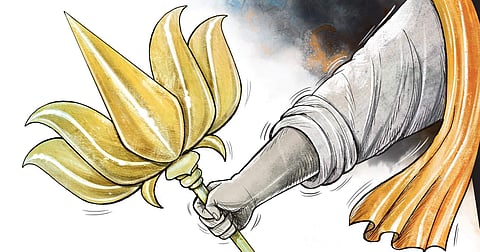

What exactly did Prime Minister Narendra Modi mean when, in his election speech in Wardha, he taunted Congress president Rahul Gandhi for being afraid to face Hindus and running away to a seat where “the majority is a minority”?
The PM’s remarks made one uneasy. The immediate implication was that the majority community and the minorities stand in direct opposition to one another in this election. What else can one conclude from a statement that accuses a candidate of finding a minority-dominated constituency “safe” and a majority-dominated one risky?
The BJP has never tired of declaring that the 133 crore population of India reposed its faith in the party in 2014. It’s another matter that according to the Election Commission, the voting percentage in the 2014 general elections was less than 70 per cent, and only 31 per cent of voters chose the BJP. Even still, there is no evidence to show that those approximately 30 crore voters were all Hindus, nor has the BJP leadership ever claimed so.
On the contrary, the party’s 2014 slogan ‘sabka saath sabka vikas’ tempted many a sceptical Muslim to put aside memories of Gujarat 2002 and vote for it, this writer has often heard them say. According to a Lokniti-CSDS study, the BJP got 9 per cent of the Muslim vote, whereas in 2009 it had got just 4 per cent.
But in the Wardha speech which projected the majority and the minorities as separate entities, the BJP top leadership made it clear whose side it was on. “Our culture which is more than 5,000 years old, which sees the world as one family,” had been insulted, the prime minister said. “Didn’t you feel hurt when you heard the words ‘Hindu terror’,” he asked the overflowing maidan. “The country’s mainstream, the crores of Hindus who were thus tainted, would never forgive the Congress for this sin.”
What else was this but an assumption by the BJP leaders that their audience was all Hindu? Don’t they even expect Muslims to attend their rallies? This writer has met Muslims who are with the BJP for a number of reasons. What would a Muslim attending his rally have felt?
“Those whom they called terrorists have now awakened,” the prime minister declared. “The Congress knows this, therefore it is running away, unable to face the Hindus.” So, while Hindus—who according to the BJP leadership, constitute the “mainstream”, wouldn’t forgive the Congress for its “sin” against them, the “minorities” of Wayanad would? Imagine what the average Muslim and Christian—the two minorities in Wayanad—must have felt hearing this.
This projection by the top BJP leaders of themselves as Hindus who identify with the majority community should not surprise us. It’s a myth that in 2014, the BJP presented the image of a ‘moderate’ party committed only to development.
That image was there, but the party leadership’s Hindu identity was also very much there. An analysis by this writer of the election speeches of the current prime minister from October 2013 till the end of the campaign in May 2014 showed that he projected himself as a Hindu leader in a variety of ways. To cite a few: the praying at famous temples and invocation of local deities, places of worship and icons at all the campaign venues, but never of any Muslim place of worship or icon, not even in Ajmer or Shahjahanpur, where lie the graves of two famous Muslim freedom fighters, Ashfaqullah Khan and Maulvi Ahmadullah Shah; the crude references to those who traded in the “pink flesh” of animals and speaking disparagingly of the Pink Revolution (the term used to describe India’s leading place as a meat exporter—which, incidentally, continues to remain the same even during the BJP’s reign); the denigration of those who were “brought” to Assam from Bangladesh to “steal our jobs” and the sympathy for those who came fleeing religious persecution; and the constant attack on “vote bank politics”, which was used as a euphemism for Muslim voters. In Wardha too, it was alleged that the Congress had coined the term “Hindu terror” for the sake of “vote bank politics”.
Throughout the 2014 campaign, the BJP leadership linked nationalism with Hinduism, echoing the theme of “cultural nationalism” popularised by L K Advani during the latter’s 1990 rath yatra and the 1991 Lok Sabha elections. By the end of the campaign, the BJP had built a solid Hindu vote bank for itself.
Even after they attained power, the leaders of the BJP could not resist pitting the audience against Muslims, whether in the 2015 Bihar Assembly polls, where they warned OBCs that their rivals were planning to snatch away the benefits of reservations from them and give them to “another community”, or in the Uttar Pradesh Assembly polls, where they compared “shamshan” with “kabrastan”. At that time, the rule of the party at the Centre was certainly not under threat.
So today, with general elections coming up, the party leadership’s divisive rhetoric shouldn’t surprise us. This is still early days. Hindutva has not replaced the real issues. As it had in 2014, it will go side by side with them.
Jyoti Punwani
Freelance journalist based in Mumbai
Email: jyoti.punwani@gmail.com